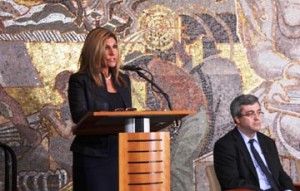Kristopher Rivera
Scripps Howard Foundation Wire

WASHINGTON – Mike Periu, a Cuban-American, has no preferred party when it comes to elections.
“It doesn’t make any sense to look at a political party,” Periu said.
The founder of the consulting business Proximo International, Periu is one of the many Latinos who says he will vote based on who will help his community prosper.
“I think to make an informed decision, you have to think about how you live your daily life,” Periu said. “How you want to live your life, what are the values that you and your family cherish, and which one of the candidates actually represents those values, because anyone can say anything at a debate.”
He was one of several Hispanic leaders who spoke last week at a discussion about the election sponsored by the AFL-CIO, the National Council of La Raza and Univision.
Foremost, Latinos in these groups want a president who will push for pro-immigrant and humane immigration policies leading to citizenship.
The Obama administration’s Dream Act is a small step in the right direction, but Congress needs to do more, according to a statement of policies in a report, “Prosperity Economics: Building an Economy for All” that formed the base for the discussion.
In addition to participating in the presidential elections, if Latinos want to get closer to having policies changed it is imperative they know who to vote for in Congress, the speakers said.
Janet Murguía, president and CEO of NCLR, said Sen. Patty Murray, D-Wash., and Senate Majority Leader Harry Reid, D-Nev., attribute their victories in the 2010 elections to the Latino vote.
The speakers also said that Latinos want to see a president who can help small and new businesses thrive.
“Despite economic challenges, Hispanics in the U.S. have proven to be hard working and entrepreneurial,” Teresa Rodriguez, co-anchor of Univision’s primetime magazine, “Aquí y Ahora,” said.
Rodriguez said the 2010 census found there were more than 2 million Hispanic-owned businesses in the country. Those businesses created jobs and generated nearly $275 billion in revenue, according to the Kauffman Index of Entrepreneurial activity.
From 2009 to 2010, the Hispanic business creation rate was the highest ever recorded, according to the index.
The Kauffman foundation found that the source of new job growth in the U.S. for the past 35 years is from new companies.
Many Latinos will look to see which candidate supports the Latino workforce. A report from the U.S. Department of Labor found that Latinos made up 15 percent of the U.S. labor force in 2011 and by 2018 are expected to represent 18 percent of the labor force.
The speakers said that voting for president and members of Congress influences other parts of government. For example, approximately 1,000 administrative branch jobs are filled by presidential appointment with Senate confirmation and congressional committees have many staff positions.
Investing in education is important among Latinos as well. Hispanics have the highest dropout rates in the nation.
Murguía said developing a competitive workforce among Latinos is dependent on the quality of education they receive.
“We know the current challenges that are out there for a number of our young people when it comes to educational attainment rates,” Murguía said. “If we’re not investing in those children right now we’re undermining, not just the future of the Latino community, we’re under miming the future global competitiveness of this country and the future workforce of this country.”
Murguía said it is important for those in the Latino community to understand the importance of voting if they want to see a change in policies.
“I know that at NCLR we have to take on civic engagement as a very top priority and one that we don’t see as just happening every four years in a presidential election, but it has to be a sustained commitment. That’s what is going to transform the future for civic engagement in our community,” Murguía said.
Reach reporter Kristopher Rivera at kristopher.rivera@shns.com